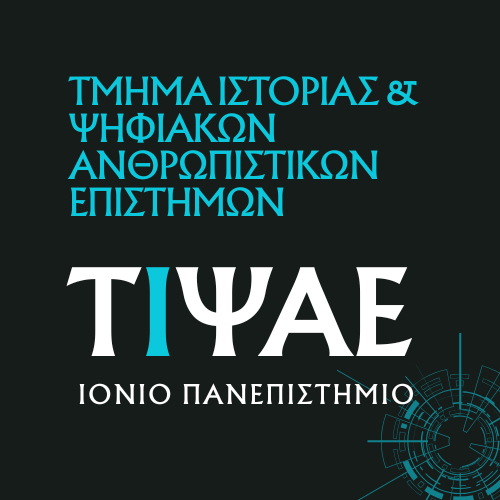DIDACTICS-THEORY AND PRACTISE
Teaching Staff: Angelakos Konstantinos, Kourgiantakis Charalambos
Course Code: ΙΕΑ102
Course Type: Compulsory
Course Level: Undergraduate
Course Language: Greek
Delivery method: Lectures
Semester: 8th
ECTS: 5
Curricula: Curriculum in History up to 2024-25, Curriculum in History and Digital Humanities from 2025
Co-lecturer: Ch. Kourgiantakis
Presentation and critique of basic concepts from the field of General and History Didactics, such as curriculum, aims and objectives of teaching, organization structure, learning outcomes, assessment of teaching activity, teaching material (printed and electronic). Students are invited to appreciate these parameters through:
I. New trends in history teaching within the contemporary educational reality.
II. The internship at secondary schools, which leads to the organization and conduct of an integrated and innovative teaching.
• Presentation of the modern developments in the field of General and History Didactics.
• To highlight the role and ideological framework of the curricula in general and, in particular, the teaching of History.
• To highlight the importance of interdisciplinary and inter-science in the teaching of history.
Learning Outcomes to be Achieved
Upon successful completion of the course the student will be able to:
• Familiarise with the basic concepts of writing, teaching and curriculum assessment.
• Understands the importance of cultivating critical thinking and historical consciousness.
• Explores and evaluates the types of sources and their causal relationship with the learning outcomes.
• Designs innovative teaching scenarios, in line with modern teaching practices in History Didactics.
1st week: Summary of the subject and module of the course. Inform students about the work to be done during the academic semester and how they will be evaluated. In the introductory lesson the concept of teaching and its connection to the functions of the School (Curriculum, Teaching Manual).
2nd week: Planning of teaching: choices of teaching methods and teaching strategies. Selection and utilization of teaching material. Teaching scenario.
3rd week: What is the content and meaning of the teaching subject of History and for what reasons we deal with it: historical knowledge, historical fact and historian as a personality.
4th week: Objectivity and fiction in History. Historical narrative, historical sources (their use and misuse), historical explanation and history textbooks
5th week: The "secondary concepts" in the teaching of history and their key role in the critical approach of the past and the formation of the student's (and human) historical culture and thinking. Historical imagination and historical empathy.
6th week: Teaching History and Critical Thinking. Memorization, critical thinking, historical thought, historical consciousness in the School.
7th week: Proposals of productive history teaching (construction of maps, visual works, historical chronologies, dramatization, role play, interactive debate, argumentation, visits to museums, monuments and historical sites). Advantages and disadvantages of each proposal.
8th week : Interdisciplinary Approach to the History Course (Literature / Historical Novel, Language, Social and Political Education, etc.).
9th week: Assessment in the history lesson. Theory and reality. Problems in the assessment.
10th week: Teaching History and New Technologies. Dangers, concerns, use and abuse, effective or non-profitable use of the Internet and ICT.
11th - 13th week: presentation students work • discussion, commentary, self-evaluation and hetero-evaluation work.
Stenhouse L. (1975). An Introduction to Curriculum Research and Development, London: Heinemann.
Kalantzis Μ.-Cope B. (2013). Νέα μάθηση: Βασικές αρχές για την επιστήμη της εκπαίδευσης, Αθήνα: Κριτική.
Αγγελάκος Κ.-Κόκκινος Γ.(Επιμ.) (2004). Η Διαθεματικότητα στο σύγχρονο σχολείο και η διδασκαλία της ιστορίας με τη χρήση πηγών. Αθήνα: Μεταίχμιο
Κάββουρα Δ. (2010). Διδακτική της Ιστορίας, Μεταίχμιο, Αθήνα
Κόκκινος Γ. (1998). Από την ιστορία στις ιστορίες, Αθήνα: Ελληνικά Γράμματα.
Κουργιαντάκης Χ. (2015). Το παρόν και το μέλλον του παρελθόντος, Αθήνα: Κέδρος.
Moniot H. (2002). H διδακτική της ιστορίας, (μτφρ. Έφη Κάννερ),Αθήνα:Μεταίχμιο.
Lectures, presentations, interactive discussion, work individually and in groups
Objective: self-action, development of cooperative skills, strengthening of the structural elements of critical thinking (logical reasoning, metacognition).
Support Learning through the e-class e-class platform
Organization of innovative teaching, conducting sample teaching in the classroom.
Assessment: Essays, oral presentation, written examination.
Back



